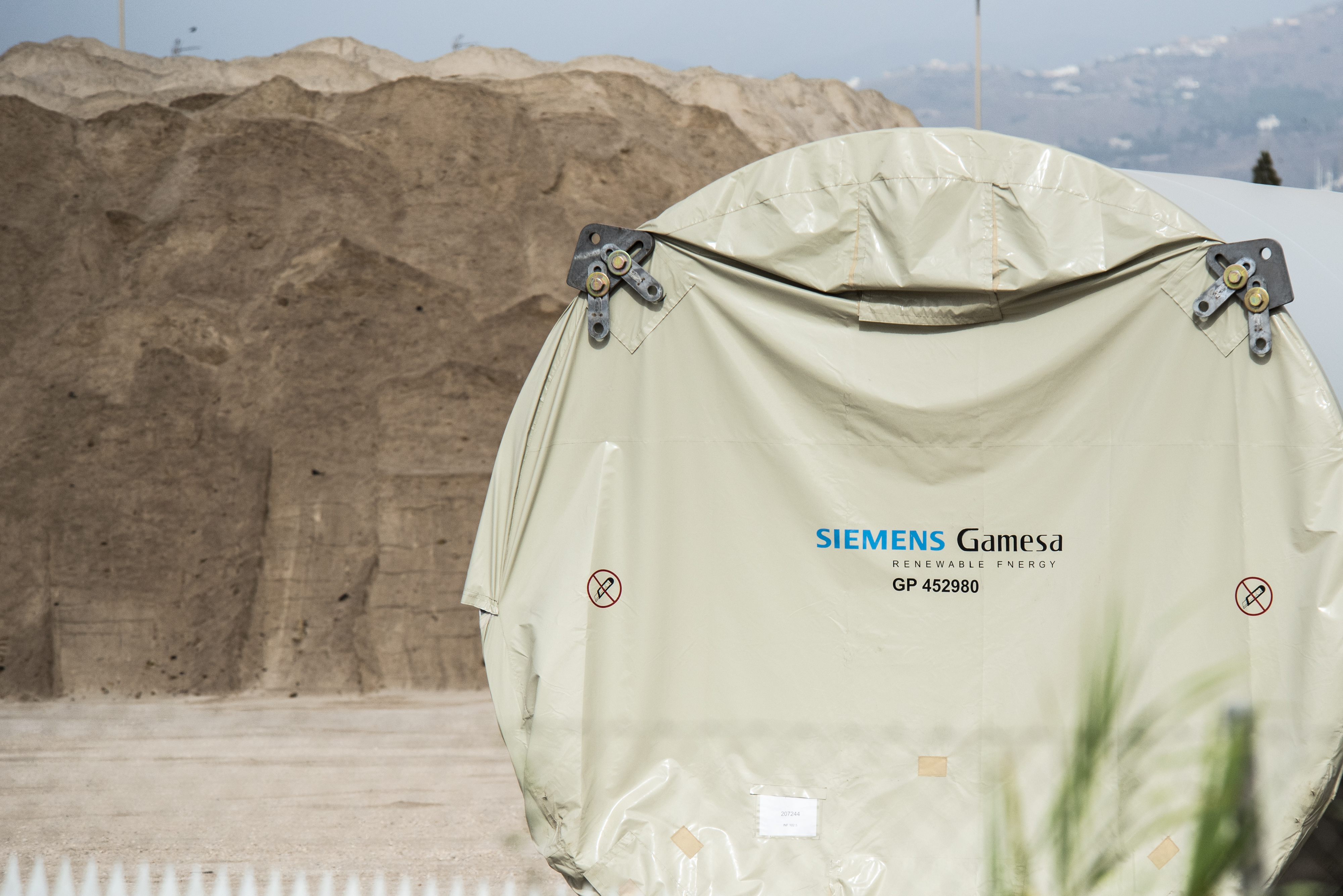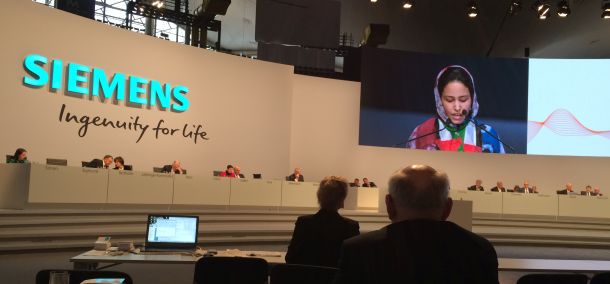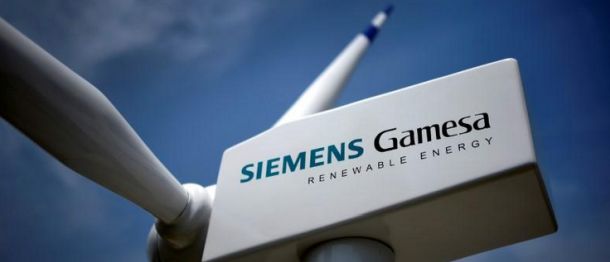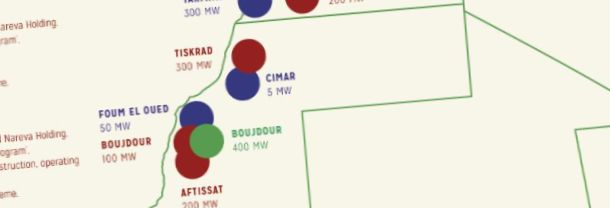
The German multinational - which supplies the Moroccan energy projects in the occupied territory - fails to grasp EU court rulings.
Photo: Siemens windmills being shipped from Motril, Spain, to occupied Western Sahara.
At its Annual General Meeting on 20 February 2025, Siemens Energy attempted to present the rulings of the Court of Justice of the European Union (CJEU) as a framework for its operations in Western Sahara.
The company has over the years supplied windmills to the Moroccan government's energy projects in the occupied territory.
However, rather than fully acknowledging the implications of these rulings, the company seems to selectively highlight aspects that might justify its continued, controversial involvement in Western Sahara.
“The projects for which Siemens Energy has supplied technology components serve to electrify Western Sahara and thus benefit the entire population. In its ruling, the European Court of Justice stated that the fact that the rest of the population in Western Sahara also benefits from the advantages is in principle not harmful. However, the ruling makes it clear that the benefits must be more closely aligned with the living conditions of the Saharawi population, who may also be settled outside Western Sahara. We will take this into account in future decisions”, Christian Bruch, the CEO of Siemens Energy, stated at the annual meeting.
Siemens Energy appears to suggest that merely aligning benefits with the living conditions of the Saharawi people would suffice for compliance with international law. This overlooks the key conclusion of the CJEU rulings: the Saharawi people's right to self-determination ought to be respected. As such, the people of Western Sahara must consent to agreements, or contracts, affecting the territory. That consent ought to be explicit, but can also be presumed if a set of strict conditions have been met.
Siemens seems to want to use the concept of presumed consent in relation to its operations in the territory, but in a very narrow and selective way. The company appears to be suggesting that if it can provide some of the benefits to the Saharawis, business as usual can continue.
But that is not how the highest Court in the European Union has defined presumed consent.
First, no responsibilities may be imposed on the people of Western Sahara. And second, the Saharawi people - which is not the same as the population of the territory - must receive a specific, tangible, substantial and verifiable benefit from the exploitation of that territory’s natural resources which is proportional to the degree of that exploitation.
To follow up the misreadings, WSRW has sent Siemens Energy a letter questioning the integrity of its statements and the company’s commitment to upholding international legal standards.
In the current context of occupation, the application of presumed consent requires that the Moroccan government recognises the separate and distinct status of Western Sahara and the right of its people to self-determination. Additionally, Morocco would need to accept that it can only have a limited administrative role in relation to projects in Western Sahara to safeguard the Saharawi people's rights, but cannot act in its sovereign capacity – which it does not have in relation to the territory.
That is not the current reality. Morocco will not assume the administering responsibilities, which cannot be imposed on the Saharawis, as they don't control large parts of the territory - Morocco sees itself as a sovereign power in its “southern provinces” in the territory, and does not recognise the Saharawi people's right to self-determination. In that context, it is seem practically impossible to square providing a “specific, tangible, substantial and verifiable benefit” to the Saharawis, as the EU Court has ruled, with Morocco accepting a project to be conducted in this manner.
“To be clear, this issue is not about redistributing benefits - it is about respecting the right to self-determination. Siemens Energy must directly engage with the Saharawi people regarding any current and planned operations in Western Sahara, ensuring they do consent to projects and that these projects provide them specific, tangible, substantial and verifiable benefits”, WSRW wrote to Siemens Energy.
For over a decade, different Siemens branches have operated in Western Sahara without seeking the consent of the Saharawi people, ignoring their objections, and instead asserting that its projects benefit the territory. The Polisario Front - the UN-recognised representative of the people of Western Sahara, and acknowledged by the CJEU as a legal person with standing in EU courts to defend the Saharawi people's right to self-determination - has explicitly condemned Siemens Energy’s activities in the territory.
In addition to supplying Moroccan wind energy projects in the territory, Siemens Energy has also, according to the Moroccan government, submitted its candidacy in the tender for the so-called ‘electric highway’ that will supply energy generated by the wind farms in the occupied territory to Morocco proper.
A transcript of the questions by WSRW and Dachverband der Kritischen Aktionärinnen und Aktionäre, as well as of answers from the executive board of Siemens Energy during the 2025 AGM, can be accessed here.
WSRW wrote Siemens AG on 06.03.2012, 19.06.2012, 03.07.2013, 26.09.2016, 07.12.2017, and received response from Siemens AG on 10.05.2012, 10.10.2016, 08.01.2018. WSRW wrote Siemens Gamesa on 01.10.2018 and 20.08.2021. Siemens Gamesa wrote WSRW on 16.11.2018, 24.04.2020, 07.04.2021 and 27.09.2021. WSRW wrote Siemens Energy on 18.02.2021, 30.11.2023 and 20.11.2024. Siemens Energy wrote WSRW 23.03.2021 and 03.12.2024. Siemens Energy was confronted over the matter at the AGMs in 2021, 2022, 2023, and 2024, Siemens Gamesa at the AGMs in 2022 and 2023, and Siemens AG at the AGMs in 2017, 2018, 2020.
Since you're here....
WSRW’s work is being read and used more than ever. We work totally independently and to a large extent voluntarily. Our work takes time, dedication and diligence. But we do it because we believe it matters – and we hope you do too. We look for more monthly donors to support our work. If you'd like to contribute to our work – 3€, 5€, 8€ monthly… what you can spare – the future of WSRW would be much more secure. You can set up a monthly donation to WSRW quickly here.
Siemens again refuses to answer questions about Western Sahara at AGM
For the fourth consecutive year, the German engineering company dodges questions at its Annual Shareholders Meeting as to whether it has obtained the consent of the people of Western Sahara to operate on their land.
Siemens fails to respond Western Sahara question at AGM
Why did you not seek permission from my people?, a Saharawi refugee asked at Siemens AGM. Company fails to answer questions why it operates on occupied land.
Siemens: the Moroccan king's wind turbine supplier in Western Sahara
WSRW has again asked Siemens to clarify how they’ve obtained the consent of the people of Western Sahara to their involvement in literally all of Morocco’s wind power plans in the occupied territory.
Moroccan wind energy in occupied Western Sahara passing 40%
Even more wind farms are being planned in occupied Western Sahara, and all of them are in the portfolio of the Moroccan monarch's company NAREVA.



